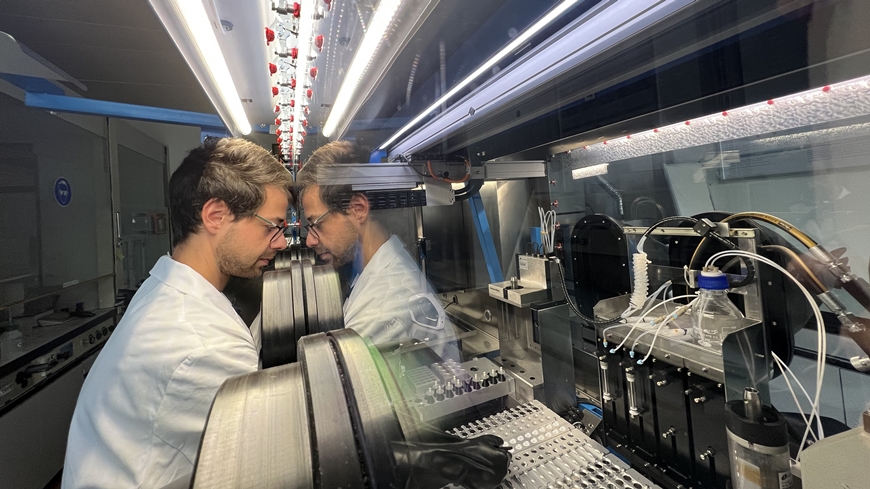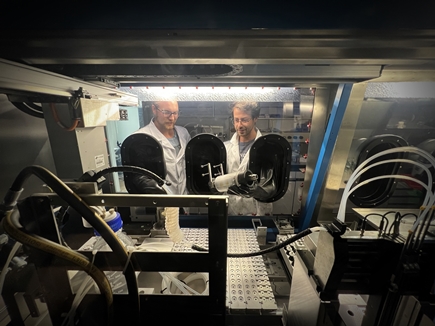Boost for international battery research
Empa robot delivers largest open dataset for battery research
Researchers at Empa, together with international partners, have published the largest open battery dataset to date in a new data format. The data from Empa's Aurora robot platform sets new standards for quality, traceability, and collaboration in international battery research – and is expected to significantly accelerate it.

The Battery Data Alliance (BDA), together with Empa and other partners, has published the largest open dataset to date in Battery Data Format (BDF). The data comes from fully automated experiments with the autonomous robot platform Aurora, which Empa developed in collaboration with the Swiss company Chemspeed Technologies. The researchers are thus setting a new standard for high-quality, machine-readable battery data and for international research into new battery materials. The dataset contains charge and discharge cycles from 199 button cell batteries with NMC/graphite and LFP/graphite chemistry. Each battery was tested over 1000 cycles under fully automated and precisely controlled conditions. Moreover, a scientific publication appeared in the journal Batteries & Supercaps that describes the robot-assisted research platform and classifies the dataset.
A new standard for battery data

Publishing data in the Battery Data Format ensures that it remains transparent and traceable, is compatible with common analysis tools, and complies with FAIR data principles (Findable, Accessible, Interoperable, Reusable). This allows researchers worldwide to easily use and process the data. “By combining robotics with FAIR-compliant data management, researchers are laying the foundation for faster and more reproducible battery research – and thus driving global innovation in energy storage,” explains BDA Chairman Gabe Hege. Corsin Battaglia, head of Empa's Materials for Energy Conversion laboratory and professor at ETH Zurich and EPFL, also emphasizes the importance of structured data: "When scientific data is structured according to common standards and provided with complete traceability, it can have an impact far beyond individual projects. In this form, it becomes a shared resource that promotes collaboration, accelerates discoveries, and can transform entire fields of research."
The basis for a new generation of standardized battery data was developed in close collaboration between Empa and the Norwegian research institute SINTEF as part of the European battery research initiative Battery2030+ and the ETH Board's Open Research Data initiative. The dataset is freely accessible on the Zenodo online platform and is intended to accelerate battery research worldwide.
Battery Data Alliance (BDA)
The Battery Data Alliance (BDA) is an open initiative of the Linux Foundation that promotes standardized, FAIR-compliant data practices in battery research. It develops and maintains the Battery Data Format (BDF) and supports a growing ecosystem of tools, datasets, and partners to accelerate discoveries, modeling, and innovation in global battery research.
Prof. Dr. Corsin Battaglia
Materials for Energy Conversion
Phone +41 58 765 41 31
E Svaluto-Ferro, G Kimbell, Y Kim, N Plainpan, B Kunz, L Scholz, R Läubli, M Becker, D Reber, P Kraus, C Battaglia: Toward an Autonomous Robotic Battery Materials Research Platform Powered by Automated Workflow and Ontologized Findable, Accessible, Interoperable, and Reusable Data Management; Batteries & Supercaps (2025); doi: 10.1002/batt.202500155
E Svaluto-Ferro, G Kimbell, Y Kim, N Plainpan, B Kunz, L Scholz, R Läubli, M Becker, D Reber, P Kraus, R-S Kühnel, C Battaglia: Dataset for publication "Toward an Autonomous Robotic Battery Materials Research Platform Powered by Automated Workflow and Ontologized Findable, Accessible, Interoperable, and Reusable Data Management"; Dataset, Zenodo (2025); doi: 10.5281/zenodo.15481956
-
Share






